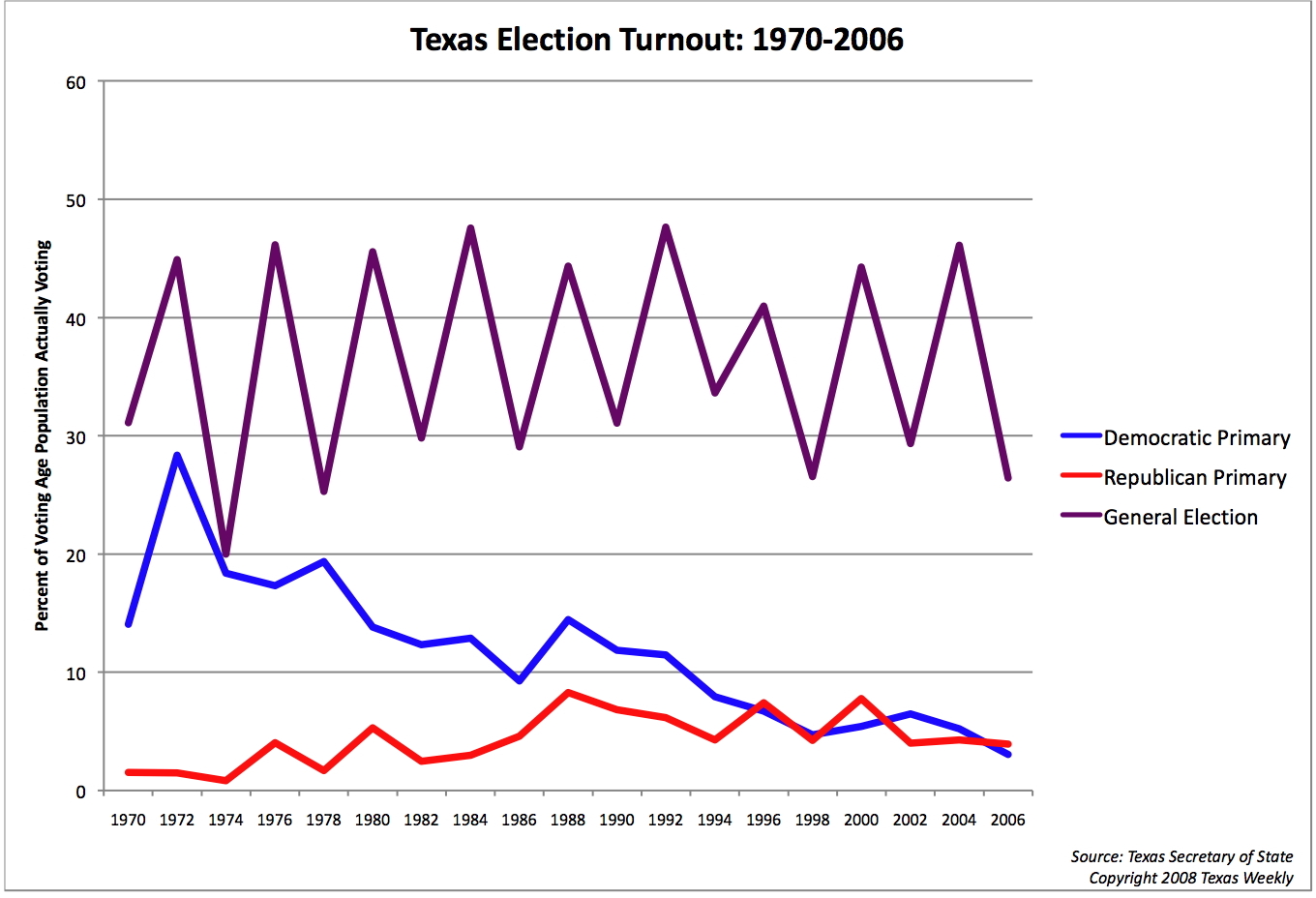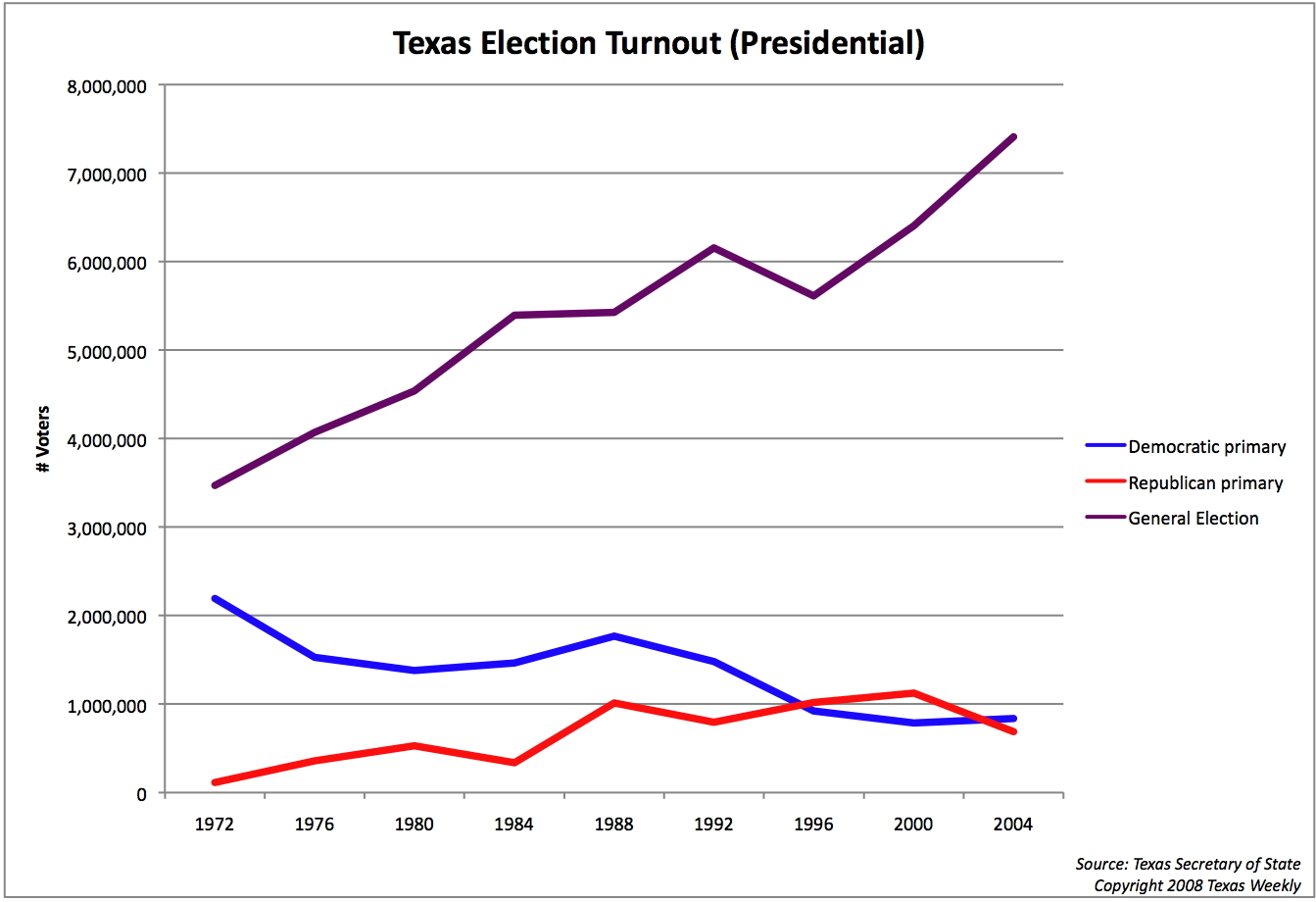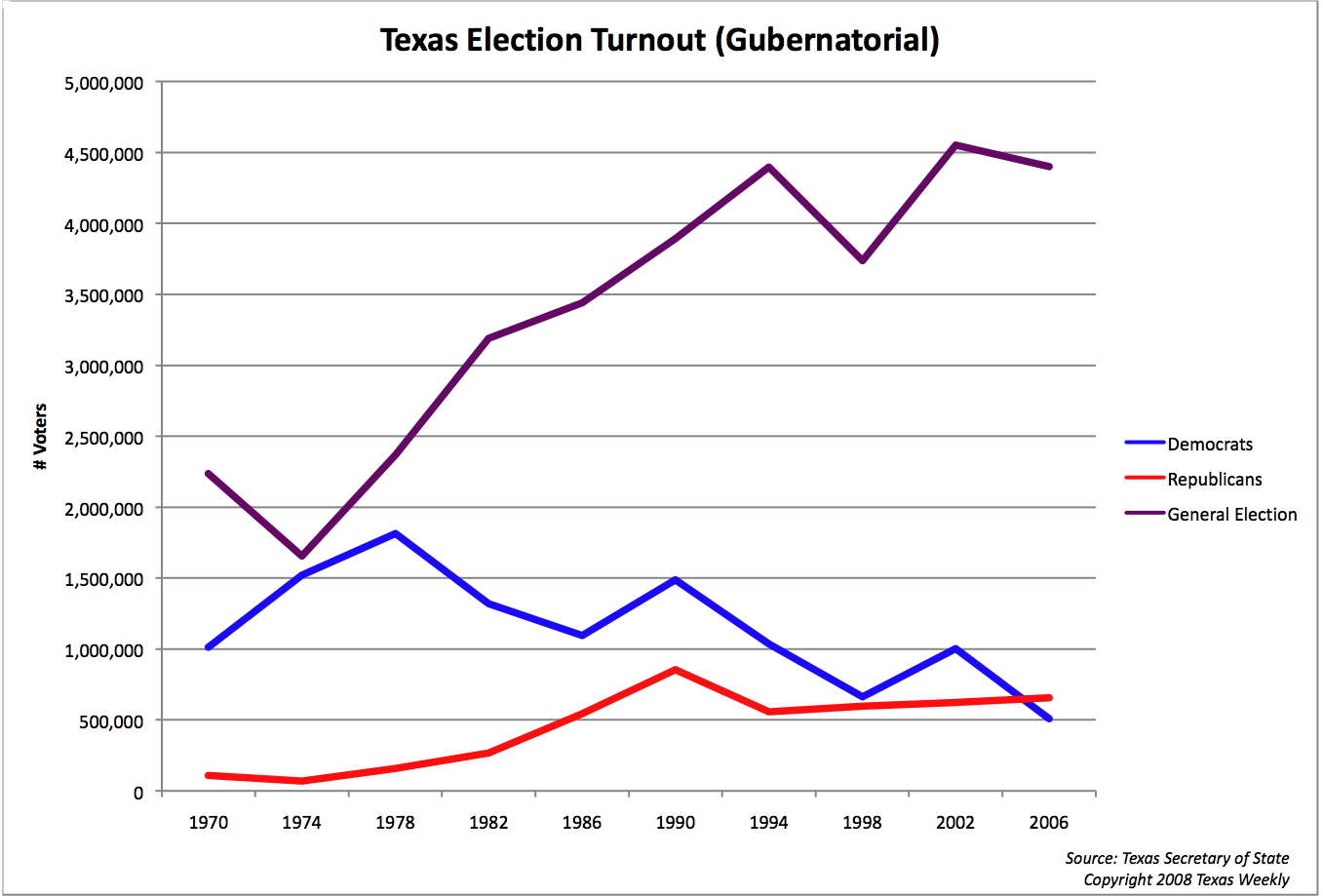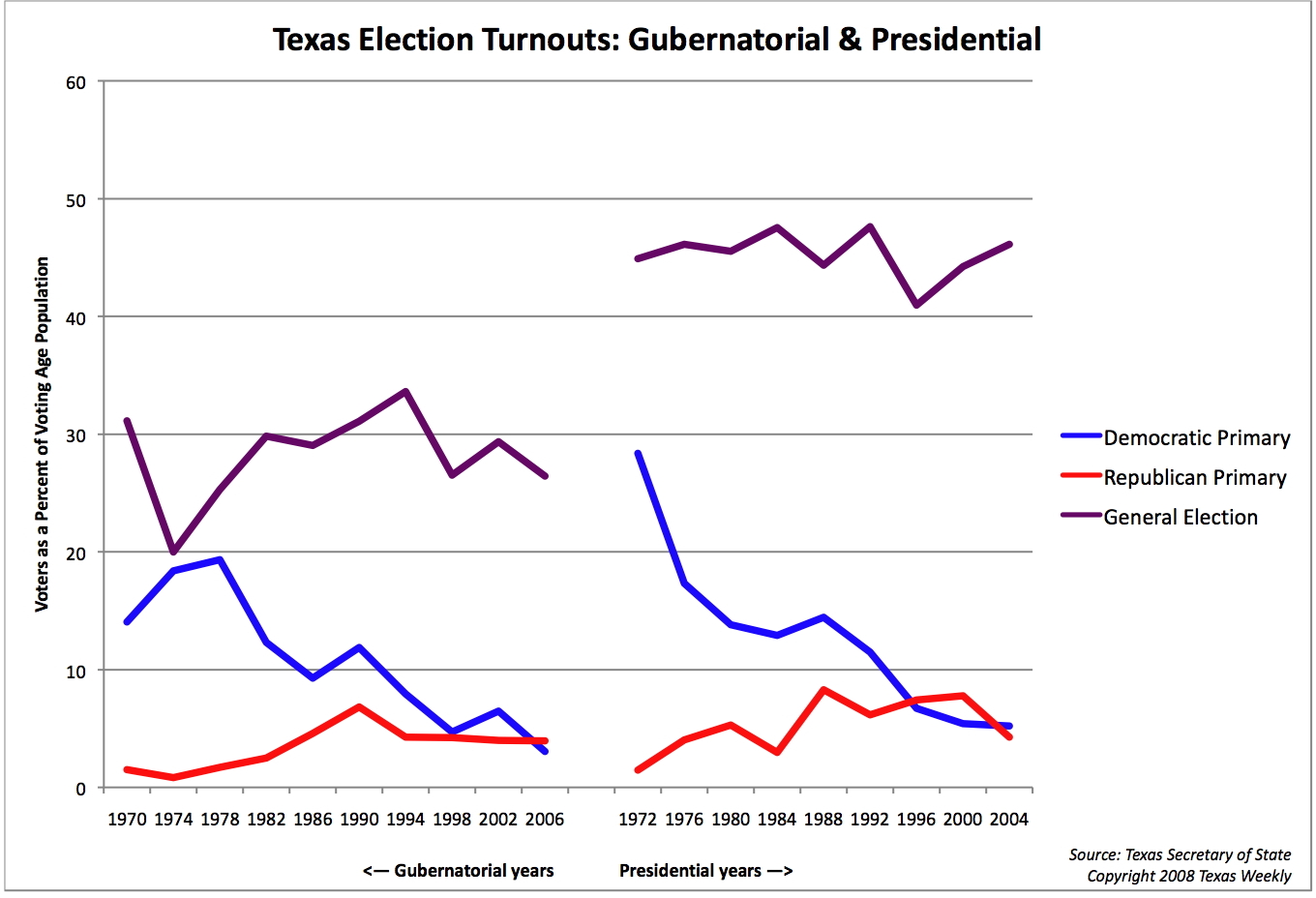Fantasy Politics
You can always find a candidate in Texas whose campaign blueprint is dependent on a rare or unprecedented event.
Sometimes it's a political shrimp who pays the filing fee like you'd pay for a lottery ticket, holding the fantasy in mind for a minute and hoping or wishing that getting on the ballot will get them a leather chair in the statehouse. Think of Victor Morales' first run for U.S. Senate, when he beat two congressmen and a prominent lawyer in a Democratic primary in 1996, or of Steve Mansfield, a Republican who unexpectedly knocked an incumbent Democrat off the Texas Court of Criminal Appeals in 1994.
Sometimes it's a big fish. Tony Sanchez Jr. ran for governor on the theory that a lot of people would show up to vote who had never voted before. And that they'd vote for him. And other Democrats on the statewide ticket (some of whom might have sold him on the idea in the first place).
But this year's unprecedented thing has some data behind it. The hyperactive presidential race remains unsettled ? at least on the Democratic side of the ledger ? and it's been bumping up turnouts in other states on its way here.
Think of it: All those Texans who give money to candidates on both sides of presidential elections actually lived to see some of that money get spent in their home state.
The Texas primaries are on March 4. Early voting starts just more than a week from now ? on February 19. And national candidates are starting to do something they haven't done in Texas in years and years. They're campaigning, spending money on ads, and trying to gin up excitement and support.
The updraft will probably affect Texas candidates. They and their consultants and friends are trying to figure out what to do, who's at risk, and who's about to win the electoral lottery.
? Republicans either lucked out or not. Lookit: Incumbents running for reelection are already nervous about what might be an electorate looking for change. A presidential candidate pushing that message brings more people to the polls, supposedly in search of fresh faces, new candidates. Without a GOP primary to speak of, turnout might be normal: Good for incumbents, bad for challengers.
Local mileage can vary, however. Those incumbents still have to work on whatever made them nervous in the first place. State lawmakers who were on the watch list two weeks ago ? when most people thought Super Tuesday would settle this round of the national debate ? are still on the watch list today.
? Democrats have a different take on this. Say you're in a district where voter turnouts are generally low. Rep. Kevin Bailey, D-Houston, is an example. He got 70 percent of the vote in the 2006 Democratic primary, but only won by 517 votes in a district where 1,295 people bothered to show up for the primary. Compare that to, say, Norma Chavez, D-El Paso. She got 70 percent, too. And her raw vote margin was 3,910 votes of 9,724 cast. A relatively small number of new voters could change the outcome in Bailey's district. It could save him if the new voters don't like his challenger this time. It could kill him if they're out for change. It could change the demographics of the vote. Bailey, an Anglo representing a minority district, is being challenged by a Latino, Armando Lucio Walle. Bailey can win with a standard turnout, but who benefits from a higher one? It depends on what the new voters want in a candidate.
Consultants we talked to generalize in two different directions. In some races, incumbents have been winning with static turnouts and new voters represent the danger of change. At best, they don't know the incumbents and owe them no allegiance. There's a flip to that. Say U.S. Sen. Hillary Clinton comes to the state looking for votes and hires people in your area who have also worked for you in the past. A candidate in that situation can piggyback on the well-funded presidential campaign, leveraging get-out-the-vote and voter contact efforts. Rep. Doro Olivo, D-Rosenberg, has a tough reelection race against Ron Reynolds of Missouri City. She's Hispanic, and he's African-American. We've heard the argument that Barack Obama's presence on the ticket will help Black candidates. But Olivo's name was one of seven "leading Texas Democrats" named in Obama's announcement of grass-roots support in Texas.
If you're building a watch-list for the primaries ? a basis for those post-primary autopsies ? put Bailey and Olivo on it, and all the other Democratic primaries you can find. It's hell on the candidates, but it'll be good material for the political science nerds after this is over.
? Another theory holds that busy party primaries hurt moderate candidates. Reps. Pat Haggerty, R-El Paso, and Charlie Geren, R-Fort Worth, might get votes from independents in their primaries but for the attraction of the Democratic presidential fight. If they're dependent on those independents for victory ? that remains to be demonstrated ? the active primary could hurt them.
? And the consultants. Republican consultants are getting cheated, relatively speaking. If you look at election turnouts over the last 30 years in Texas, you see fewer and fewer people voting in primaries, relative to the number of voting age people in the state (last year, the Voting Age Population, or VAP, was 16.6 million; 1.2 million of them voted in the primaries).
So the lists of regular Republicans and regular Democrats are pretty well worked. Suppose you could get an election that boosted the pool of voters. Take the full list of names, delete those on the old list, and you've got a lot of fresh leads for the next election cycle. That's the election cycle, by the way, that picks the legislators who'll redraw legislative and congressional political maps in 2011. Democrats, assuming they get a big turnout next month, will get lots of new leads. Republicans, without a fight to draw a crowd, won't.
Unlike the rest of this, those lists don't come available just where there are hot local races. The presidential draw to the polls ? if it turns out to do here what it's done elsewhere ? is statewide. New voters could be showing up in parts of Texas where the local races aren't even interesting.
Chart Freak
The bloom in voting around the country has Texas politicos wondering what'll happen to turnout here, both in the March primaries and in November. Four years ago, just over 1.5 million people voted in the Democratic and Republican primaries here ? about 9.5 percent of the state's voting age population.
We decided to go nuts with the historic numbers, to get an idea of previous turnouts and to get ready for March 4, when we'll find out just how jazzed people really are about these primaries. This first chart is all regular state elections from 1970 to now. The "shark's mouth" line covers general elections with presidential and gubernatorial candidates on board; more people vote in presidential years and that's why you get that sawtooth pattern. Democrats fell from the big turnouts of a one-party state to the lower turnouts that mark our present-day politics.
This one maps raw vote totals in presidential primary years. The state's population has grown, as has the general election vote total. And the parties over the years have reached rough parity, at least in turnouts. The total number of voters who show up for primary elections has declined in recent years, in spite of growth in the state's population.
Fewer Texans vote in gubernatorial election years, but the trends match, more or less, those of presidential election years.
Finally, we put the prexies and the goobers are on the same chart and filtered out population growth by ditching raw vote totals in favor of turnout as a percentage of voting age population. If this is a normal year ? that is, if the soothsayers are wrong and turnouts do what they've always done ? 40 to 50 percent of the state's voting age population will vote in November, the Democratic primary will draw 5 to 7 percent, and the GOP primary will draw 4 to 8 percent. A note: Republican primary turnouts in Texas were higher than normal in the last two cycles, as they had a Texas Republican on the ballot.
The Sunshine Boys
Republican U.S. Reps. Sam Johnson and Ralph Hall are accustomed to winning. And in spite of their advanced years ? Johnson is 77 and Hall is 84 ? neither is throwing in the towel this year.
That didn't stop a crowd from signing up to run against them. Eight Republicans and four Democrats are saying, in effect, that after 18 years in the House for Johnson and 28 for Hall, time's up.
The two have gotten used to people wondering if they'll retire, but both reps say their work is never done. The races are worth watching because each candidate has more than one primary opponent, meaning more chances to split the vote. There's a chance lightning will strike. And there's a chance that, even in losing, this year's candidates are positioning themselves for the day when the two incumbents move on.
Still, it's hard to ignore their victorious history. In 2006, Johnson won close to 63 percent against Democrat Dan Dodd and Libertarian Christopher Claytor. Hall won almost 65 percent that year against Democrat Glenn Melancon and Libertarian Kurt Helm. Their winning numbers have been even higher in previous years.
Johnson's CD-3 includes Plano, McKinney and Richardson. He's been in the House since 1991 and did six years in the Texas House before that. He was a POW in Vietnam. He's got two opponents in the upcoming Republican primary: financial wizard and self-proclaimed "dweeb" Wayne Avellanet and retired pilot Harry Pierce, both from Plano. Attorney Tom Daley and retired teacher and broker Ronald Minkow are vying for the Democratic spot. Claytor, an engineer, returns as the sole Libertarian. According to the Center for Responsive Politics, Johnson has almost $800,000 in campaign funds ? far more than his opponents could hope to rake in.
At 84 years old, Hall has been in the House since 1981. He was a state senator for ten years ? then a private citizen for eight years ? before winning his spot in Congress. The World War II veteran represents CD-4, which includes parts of Mesquite and Rockwall. Four Republican hopefuls are also running in the primary: businessmen Gene Christensen and Kevin George, Joshua Kowart and former Frisco Mayor Kathy Seei. The Democrats are VaLinda Hathcox, who challenged Jerry Patterson for land commissioner in 2006, and repeat candidate Melancon. The CRP says Hall has about $350,000.
Hall doesn't need a lot of money to get the word out. The same theory should hold for Johnson. And the congressmen aren't worried about their gray hairs, either. (The average age of a rep is 55, according to the Congressional Research Service.)
"I've always felt like the tenure in Congress is important to getting stuff done up here," says Johnson. "I think there's a lot to do and I'll stay up here as long as I can beat people over the head and make things happen."
Hall, who says he runs at least a mile every morning and does about 50 sit-ups before bed, says he "still has something to give."
(His wife Mary Ellen is the driving force behind his choice to run again, he says. Hall says she thought having his name on the ballot would help their son, Brett Hall, win his third term as district judge in Rockwall. But Hall the Younger doesn't have an opponent.)
"This may be my last go round," says Hall. "But the president might need one old geezer. Still, I don't recommend a floor full of 84-year-old guys."
His opponents ? and Johnson's ? agree completely.
Minkow, one of the Democrats in Johnson's race, is 70 years old. "Johnson has lost touch with his electorate," he says.
"A lot of people just stick with the status quo," says Pierce, one of Johnson's Republican opponents. "It takes courage to vote for someone new."
Avellanet, who has a big family rooted in Plano, is more optimistic about his own chances but jokes that he'll probably be proven wrong. "If I don't get elected, that's fine. I'll be around for another 30 years and Sam Johnson won't."
But Karl Voigtsberger, vice-chairman of the Collin County Republicans and candidate for county tax assessor, says he hasn't seen Johnson's opponents around town and he doesn't think he ever will. "There are always people who decide one day they want to be a congressman and that's the last we hear from them."
Ready to challenge Hall again, Melancon says the Congressman has lost touch with his district. "I don't think its good for anybody to be in Washington that long, it has a way of corrupting people," he says.
Bill Broderick, chairman of the Rockwall Country Republican Party, says, "Rockwall County is Hall country." He's not sure if Hall can carry 50 percent of the vote with four opponents in the primary, but he says none of the other Republicans stand out. As far as Hall's age, Broderick says, "You'd never know how old the guy is. When I get around Sam Johnson, I feel his age, but I don't get that feeling with Hall."
Hall opponent Christensen is 53 years old. He says if he won, he'd put a term limit on himself at 10 years. "You've gotta know when to get on the train and when to get off."
Democrat Hathcox says the economy is the biggest issue in her district, mentioning that the Popeye's and KFC nearby closed recently. But Hathcox says that's just increased business for the Chicken Express.
In this "chicken war," as she puts it, there are winners and losers. It's kind of like the races ? someone is always hoping someone else will close their doors.
? by Karie Meltzer
Money, Endorsements, and Notes
Fort Worth's Jim Wright ? former Speaker of the U.S. House and one of the state's "super delegates" to the Democratic National Convention ? endorsed Hillary Clinton for president. That announcement came as the results from Super Tuesday were rolling in, making it apparent that the Democratic side of the presidential race is probably coming all the way to Texas in March.
? Now that the Republican nomination is all but locked up for U.S. Sen. John McCain, he's won the endorsement of U.S. Sen. John Cornyn, R-San Antonio. Cornyn said in his announcement that he didn't want to get involved in the primaries while they were still competitive. Now, though, he wants the GOP to settle in behind one candidate.
? It looks like the presidential candidates will have a Texas debate ? probably at the end of the month ? as they campaign for big seams of votes here and in Ohio that come available on March 4. That's one of two ? the other's in Ohio ? that Barack Obama has agreed to before the primaries here. Clinton's pushing for one a week.
? Former Rep. Ron Wilson loaned $30,000 to LaRhonda Torry, the Democrat challenging Rep. Garnet Coleman, D-Houston. There's an old fight there; Coleman helped Rep. Alma Allen defeat Wilson in 2004. Two other notes: Former Judge Morris Overstreet contributed to Torry; and Torry's 30-day report didn't list a treasurer ? an issue Coleman tried to use last month to knock her off the ballot.
? The gambling pot hasn't spilled, at least as of the last report. Texans for Economic Development PAC, funded by gaming interests around the state, has more than $1 million to spend but spent only $15,000 in January, according to their report. That money went to Rep. Kino Flores, D-Palmview.
? House Speaker Tom Craddick's contribution to a political action committee helping three friendly Democrats is the only reported money that's gone from him to a particular race. Reps. Flores, Kevin Bailey, and Aaron Pe? got $50,000 each from Texas Jobs & Opportunity Build a Secure Future Inc. PAC, and Craddick, giving $250,000, was that fund's biggest funder. Another Craddick beneficiary ? $85,000 worth ? was the Stars Over Texas PAC, which hasn't given to candidates yet but has paid Dave Carney's Norway Hill Associates $122,500 for consulting and research.
? State Rep. Rafael Anchia, D-Dallas, endorsed Obama in the Democratic primary with this line: "I don't buy the argument that Latinos will not vote for an African-American candidate for president." Anchia says Texas Hispanics will identify with Obama's story.
? Former Texas Education Commissioner Mike Moses endorsed Jonathan Sibley, a Republican challenging Rep. Charles "Doc" Anderson, R-Waco. Sibley's been banging on the incumbent for voting for legislation allowing private school vouchers in 2005.
? Brian Thompson, an Anglo running against Rep. Dawnna Dukes, D-Austin, in a district that has traditionally been represented by African-American legislators, says he'll vote for Rep. Senfronia Thompson, D-Houston, for speaker if he's elected to the House.
? Former Sugar Land Mayor Dean Hrbacek ? now one of 10 Republican candidates for Congress in CD-22 ? made it onto Paul Harvey's national radio broadcast. And he's probably glad they referred to him only by title and current pursuit, and not by his name. Harvey closed a recent broadcast with this bit: "This politician is not just an empty suit. He has mailed campaign literature to area voters. However, the full-length photo of himself has been doctored a little. Includes a better-looking somebody else's body."
Political People and Their Moves
Rep. Mike "Tuffy" Hamilton, R-Mauriceville, will chair the House Natural Resources Committee, taking over for Robert Puente, D-San Antonio. Puente resigned; Hamilton was vice chairman.
House Speaker Tom Craddick also named Frank Corte, R-San Antonio, to the Bexar Metropolitan Water District Oversight Committee. That was another Puente post.
Sen. Kim Brimer, R-Fort Worth, will chair the Senate's Select Committee on Economic Development, which will do interim reviews of the state's eco devo programs. Brimer's up for reelection this year; he was named to head the panel by Lt. Gov. David Dewhurst.
Former state Rep. Paul Sadler, D-Henderson, is the new executive director of the Wind Coalition, a trade group of wind power producers and wind energy promoters. Sadler left the Texas House in 2003, after 12 years there.
John Pritchett is the new political director for Attorney General Greg Abbott's campaign. He was most recently at Austin-based Public Strategies Inc. and before that for Olson & Shuvalov, a political consulting firm. And he's worked on a mess of campaigns.
Stephen Bonner is leaving his state lobbying gig with Texas Instruments for a job with that same company heading public affairs in Europe, the Middle East, and Africa. Bonner, who was once a staffer working in the basement of the Pink Building, will be based in Brussels. Gray Mayes will take over his duties at TI.
Christine DeLoma is ditching her press pass to become the Texas Cable Association's new director of communications. She's been at the Lone Star Report for three years.
ONEOK has a new Texas lobbyist; Grant Ruckel is joining that company after five years as a Texas House staffer. He'll replace Rick Grundman, who moved into a different post with ONEOK's Texas Gas Service.
Deaths: Louie Welch, a five-term former mayor of Houston, from lung cancer. He was 89... Former Rep. Ralph Ray Wallace III, who left the Texas House in 1992 after 15 years in office, of unknown causes. He was 58.
Quotes of the Week
Attorney Tony Buzbee, quoted in The (Galveston County) Daily News about taking U.S. District Judge Samuel Kent to lunch after appearing before him in a hearing on the British Petroleum case: "As long as judges and lawyers aren't discussing court business, there's nothing wrong with it. If there is something wrong with it, you might as well indict every lawyer and every judge on this island."
Rep. Garnet Coleman, quoted in a Houston Chronicle story about Rep. Borris Miles, a fellow Houston Democrat: "He has a certain energy that bursts out at times. You can deal with it through anger management, through lessening the amount of alcohol you take."
Marisa Marquez, a Democrat challenging Rep. Paul Moreno, D-El Paso, telling the El Paso Times she's not aligned with House Speaker Tom Craddick and won't vote for his reelection: "As far as I'm concerned, no for Craddick."
Lt. Gov. David Dewhurst, talking to a business group about state finances and the outlook for the state's main business levy ? the new business margins tax: "We have no idea what this new tax is going to produce."
Sen. Kip Averitt, R-Waco, at a hearing where state transportation officials said they were $1.1 billion short because of an accounting error: " "You've got to be kidding."
Texas Weekly: Volume 25, Issue 6, 11 February 2008. Ross Ramsey, Editor. Copyright 2008 by Printing Production Systems, Inc. All Rights Reserved. Reproduction in whole or in part without written permission from the publisher is prohibited. One-year online subscription: $250. For information about your subscription, call (512) 302-5703 or email biz@texasweekly.com. For news, email ramsey@texasweekly.com, or call (512) 288-6598.
Texas Tribune donors or members may be quoted or mentioned in our stories, or may be the subject of them. For a complete list of contributors, click here.
Information about the authors
Learn about The Texas Tribune’s policies, including our partnership with The Trust Project to increase transparency in news.




/https://static.texastribune.org/media/profiles/ramsey-ross_TT.jpg)